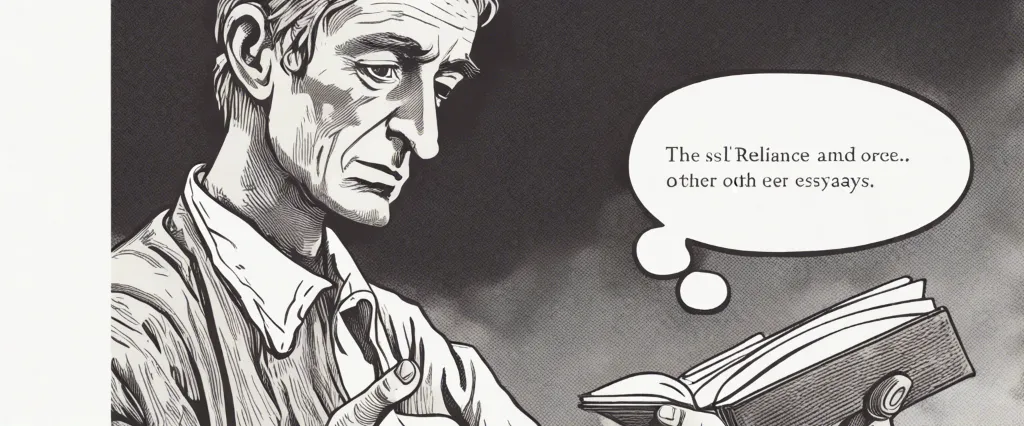——SelfReliance and Other Essays by Ralph Waldo Emerson & Descartes Error by António R Damásio

In the realm of philosophical and introspective literature, numerous authors have left an indelible mark on the collective consciousness of humanity. Two such authors, Ralph Waldo Emerson and António R. Damásio, have each offered profound insights into the human condition through their respective works: “Self-Reliance and Other Essays” and “Descartes Error.” While originating from distinct time periods and addressing different facets of the human experience, these books converge upon the fundamental theme of self-understanding and the quest for truth. Delving into the intricacies of human nature and the nature of reality itself, Emerson and Damásio beckon us to explore the depths of our existence, challenging traditional notions and offering new perspectives. As we embark on a comparative exploration of these transformative works, we shall unravel the parallels they share, discern the divergences they present, and ultimately ascertain the significance of their insights in attaining a more comprehensive comprehension of the self.
Brief Summary of Two Books
SelfReliance and Other Essays by Ralph Waldo Emerson
“Self-Reliance and Other Essays” is a collection of essays written by American transcendentalist philosopher Ralph Waldo Emerson. Published in 1841, Emerson’s work focuses on individualism, self-reliance, and the importance of trusting oneself to discover truth and meaning in life.
The book begins with the essay “Self-Reliance,” which advocates for individuals to reject conformity and societal expectations, encouraging them to have faith in their own instincts and ideas. Emerson argues that society suppresses individuality in favor of tradition, institutions, and conformity, resulting in a lack of originality and genuine personal growth. He emphasizes the importance of self-trust and independent thinking, suggesting that true greatness lies in the ability to express oneself genuinely.
Emerson then explores several other topics in his essays, including the importance of nature in one’s spiritual and intellectual development, the power of thought and contemplation, and the role of art and poetry in inspiring the individual. He encourages his readers to seek solitude and introspection to connect with their inner selves and the natural world.
Throughout the book, Emerson promotes the idea that individuals should be true to themselves and not be afraid to go against the norm to pursue their own passions and beliefs. He argues that relying on one’s own intuition and moral compass is essential for personal growth and fulfillment.
“Self-Reliance and Other Essays” serves as a call to action for individuals to break free from societal expectations, embrace their individuality, and cultivate their own unique path in life. Emerson’s timeless insights continue to inspire readers to this day.
Descartes Error by António R Damásio
“Descartes’ Error: Emotion, Reason, and the Human Brain” is a book written by António R. Damásio, a renowned neuroscientist. In this book, Damásio challenges the traditional belief that emotions are separate from reason and that reasoning is a purely cognitive process. He argues that emotions are not only an integral part of our decision-making process but also essential for our overall well-being.
Through various case studies and scientific evidence, Damásio presents the idea that emotions play a crucial role in guiding our decision-making and rational thinking. He highlights the story of a patient named Elliot, who suffered damage to the frontal lobe of his brain, rendering him emotionally flat but still intellectually intact. Damásio explores how this emotional impairment impacted Elliot’s ability to make decisions and function in everyday life.
The book also delves into the neurological mechanisms behind emotions and how they interact with cognitive processes. Damásio proposes that emotions are a biological response to stimuli, and they provide us with necessary information that influences our reasoning and decision-making. He puts forward the somatic marker hypothesis, suggesting that emotions act as markers that help us predict the outcomes of different situations and guide our behavior accordingly.
Damásio argues that neglecting the role of emotions in decision-making can have severe consequences, both on an individual level and in broader societal contexts. He suggests that understanding the relationship between emotions and reason is crucial for developing effective approaches to mental health, education, and even public policy.
In summary, “Descartes’ Error” explores the intricate connection between emotions and reasoning, challenging the traditional view that emotions are separate from rational thinking. Damásio presents compelling evidence and case studies to demonstrate that emotions are integral to decision-making and our overall cognitive functions. The book provides valuable insights into the importance of emotions in our lives and calls for a more holistic understanding of the human brain.
Comparison between Two Books

Similarities in Philosophy
Both “Self-Reliance and Other Essays” by Ralph Waldo Emerson and “Descartes’ Error” by Antonio R. Damásio discuss various philosophical concepts, although they approach them from different angles. Despite their differences, there are certain similarities in the philosophical ideas presented in the two books.
1. Individualism: Both Emerson and Damásio emphasize the importance of individual thought and experience. Emerson’s essay “Self-Reliance” explores the idea of trusting oneself and relying on one’s own intuition and beliefs rather than conforming to external influences. Damásio, in “Descartes’ Error,” delves into the significance of the individual mind and the role of emotions in decision-making, highlighting the unique mental processes of each person.
2. The Mind-Body Connection: Damásio’s “Descartes’ Error” focuses on the connection between the mind and the body, arguing against René Descartes’ dualistic view. He argues that emotions are not separate from reason but instead influence our rationality, pointing towards an integrated mind-body system. Emerson, although not explicitly discussing the mind-body connection, emphasizes that an individual’s thoughts and beliefs stem from their entire being, suggesting an inherent connection between the mind and body.
3. Authenticity: Both authors advocate for individuals to live authentically. Emerson promotes the importance of self-expression and the need for individuals to remain true to their own convictions, resisting societal pressures. Damásio, in exploring the emotional aspects of decision-making, argues that true authenticity can only be achieved when individuals take into account their emotions and bodily sensations, acknowledging their innate connection to their thoughts and choices.
4. Internal Reflection and Introspection: Emerson and Damásio both emphasize the significance of internal reflection and introspection. “Self-Reliance” encourages individuals to reflect on their own experiences and beliefs, encouraging a deep understanding of oneself. “Descartes’ Error” explores how internal reflection and introspection can provide insight into our emotions, guiding decision-making processes. Both books acknowledge the value of self-knowledge and seeking inner wisdom.
5. Nonconformity: Emerson’s work promotes nonconformity and original thought, encouraging individuals to reject societal norms and find their own paths. Damásio’s perspective aligns with this in a sense, as he challenges the traditional view of reason and highlights the role of emotions in decision-making, which goes against the prevailing view at the time.
In summary, these books share similarities in their philosophical exploration of individualism, the mind-body connection, authenticity, internal reflection, and nonconformity. While Emerson’s focus is more on personal independence and self-reliance, Damásio’s work centers around the mind-body connection and decision-making processes. Together, they address important philosophical ideas related to individuality, self-discovery, and the human experience.
Divergences in Philosophy
While both Self-Reliance and Other Essays by Ralph Waldo Emerson and Descartes’ Error by António R. Damásio delve into philosophical themes, they diverge in their approaches and subject matter.
Emerson’s collection of essays, including the renowned “Self-Reliance,” is characterized by Transcendentalist philosophy. Emerson advocates for individualism, self-reliance, and the idea that people should trust their own instincts and beliefs. He emphasizes the importance of intuition and self-trust when making decisions and argues against conformity and societal expectations. Emerson encourages readers to seek their own truths and to embrace non-conformity, ultimately advocating for a personal transcendence beyond societal norms.
On the other hand, Descartes’ Error focuses on the notion of the mind-body connection and explores the relationship between reason and emotion. Damásio, a renowned neuroscientist, challenges the long-standing Cartesian mind-body dualism, suggesting that emotions play a fundamental role in rational decision-making. He argues that emotions provide crucial information and guide our reasoning processes, contradicting Descartes’ view that reason is separate from our bodily experiences. Damásio’s work highlights the interplay between emotions, reason, and the physical aspects of our being, ultimately proposing a more integrated understanding of human existence.
Thus, the divergence in philosophy between these two books lies in their subject matter and approach. While Emerson’s writings center around individualism, self-reliance, and the importance of intuition, Damásio’s book challenges the mind-body dualism and focuses on the role of emotions in human reasoning. Emerson’s work leans more towards a philosophical exploration of existential and moral individualism, while Damásio’s work integrates neuroscience and cognitive psychology to support his arguments about the unity of mind and body.
In conclusion, Self-Reliance and Other Essays by Ralph Waldo Emerson and Descartes’ Error by António R. Damásio offer distinct perspectives on philosophy. Emerson champions individualism and self-trust, promoting personal transcendence beyond societal conventions. Meanwhile, Damásio challenges the Cartesian separation of mind and body, emphasizing the significance of emotions in rational decision-making and proposing a more integrated understanding of human existence.

Conclusion
Both “Self-Reliance and Other Essays” by Ralph Waldo Emerson and “Descartes Error” by António R Damásio are highly regarded and thought-provoking books, but the choice ultimately depends on your personal interests and preferences.
If you are interested in philosophical and transcendentalist ideas, exploring the concept of self-reliance, individualism, and the relationship between nature and the individual, then “Self-Reliance and Other Essays” by Emerson would be a more suitable choice. Emerson’s essays are known for their poetic language, profound insights, and the encouragement of self-exploration and self-discovery. This book is especially inspiring for those seeking personal growth, mindfulness, and a deeper understanding of the human experience.
On the other hand, if you are intrigued by the intersection of neuroscience, psychology, and philosophy, and have an interest in understanding how our emotions and physiological processes influence decision-making and our sense of self, then “Descartes Error” by Damásio would be a more fitting selection. Damásio offers a unique perspective on the relationship between mind and body, emphasizing the importance of emotions and their role in rational decision-making. This book is recommended for individuals interested in exploring the depths of human consciousness and the neurological basis of our emotions.
Ultimately, both books offer valuable insights into different aspects of the human experience, but your choice should be based on your personal interests and what you hope to gain from the reading experience.


